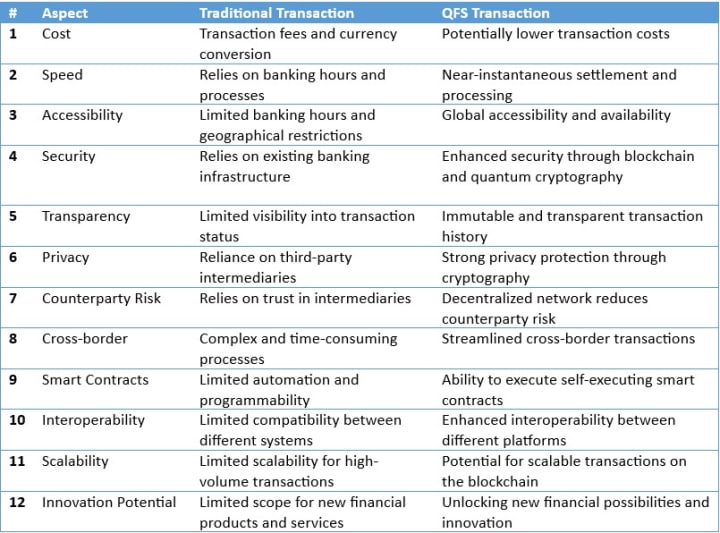Comparison of a Traditional Transaction vs QFS Transaction
Comparison between Traditional and Quantum Financial System (QFS) Transaction
A comparison between Traditional and Quantum Financial System (QFS) Transaction. Table below summarizes.

Please note that the table provides a high-level comparison and some aspects may vary depending on the specific use case and implementation of the QFS.
Cost:
In a traditional transaction, there are various costs involved, such as transaction fees and currency conversion fees. These costs can add up, especially for cross-border transactions. On the other hand, a QFS transaction has the potential for lower transaction costs due to the streamlined nature of blockchain-based transactions and the elimination of intermediaries.
Speed:
Traditional transactions often rely on banking hours and manual processes, which can result in delays, especially for international transactions. In contrast, QFS transactions offer near-instantaneous settlement and processing times. The use of blockchain technology enables transactions to be processed and confirmed quickly, regardless of the time or location.
Accessibility:
Traditional transactions may be subject to limitations, such as restricted banking hours and geographical restrictions. This can create challenges for individuals and businesses operating across different time zones or in remote areas. In contrast, QFS transactions are globally accessible and available 24/7. Anyone with internet access can participate in the QFS, providing greater accessibility and inclusivity.
Security:
Traditional transactions rely on existing banking infrastructure and security measures, which may be vulnerable to hacking, fraud, or data breaches. QFS transactions, on the other hand, benefit from enhanced security through blockchain technology and quantum cryptography. The decentralized nature of the blockchain and the use of cryptographic techniques ensure that transactions are secured, tamper-proof, and resistant to unauthorized access.
Transparency:
In traditional transactions, there may be limited visibility into the status and progress of the transaction. This can lead to uncertainty and a lack of transparency. QFS transactions, however, offer transparency through the immutability of the blockchain. All transaction records are stored on the blockchain and can be verified by participants, providing a transparent transaction history.
Privacy:
Traditional transactions often involve third-party intermediaries, which may require individuals to disclose personal and financial information. In contrast, QFS transactions offer strong privacy protection through cryptographic techniques. Participants can transact securely without revealing sensitive personal information, ensuring privacy and data protection.
Counterparty Risk:
Traditional transactions involve a level of trust in intermediaries, such as banks or payment processors. These intermediaries may introduce counterparty risk, where the trustworthiness and reliability of the involved parties can impact the transaction. QFS transactions, being decentralized, reduce counterparty risk by removing the need for intermediaries. Transactions are executed based on predefined rules and smart contracts, eliminating the need for trust in third parties.
Cross-border:
Traditional cross-border transactions can be complex and time-consuming due to the involvement of multiple financial institutions and regulatory requirements. QFS transactions streamline cross-border transactions by removing intermediaries and simplifying the process. Transactions can be conducted directly between participants, reducing the time, cost, and complexity associated with cross-border transactions.
Smart Contracts:
Traditional transactions have limited automation and programmability. Smart contracts in QFS enable self-executing transactions based on predefined rules and conditions. These contracts automate the transaction process, eliminating the need for manual intervention and enabling more efficient and reliable execution of transactions.
Interoperability:
Traditional financial systems often lack compatibility between different systems and platforms, making it challenging to integrate and exchange data. QFS, built on blockchain technology, offers enhanced interoperability. Blockchain protocols and standards enable seamless integration and data exchange between different platforms, enabling efficient collaboration and interoperability among various financial systems.
Scalability:
Traditional financial systems may struggle with scalability when it comes to processing high volumes of transactions. QFS, being built on blockchain technology, has the potential for scalable transactions. The decentralized nature of blockchain allows for parallel processing, enabling the system to handle a large number of transactions simultaneously.
Innovation Potential:
Traditional financial systems may have limitations on the scope of new financial products and services. QFS, on the other hand, unlocks new financial possibilities and innovation. The programmability and flexibility of smart contracts, coupled with the transparent and secure nature of the blockchain, provide opportunities for the development of novel financial products and services that can drive innovation in the financial industry.
Conclusion
QFS presents a transformative opportunity to address the limitations of traditional financial systems, promoting efficiency, security, transparency, and innovation. As this technology continues to evolve and be adopted, it has the potential to reshape the financial landscape, empowering individuals and businesses with enhanced financial capabilities and opportunities.
About the Creator
Enjoyed the story? Support the Creator.
Subscribe for free to receive all their stories in your feed. You could also pledge your support or give them a one-off tip, letting them know you appreciate their work.





Comments
There are no comments for this story
Be the first to respond and start the conversation.